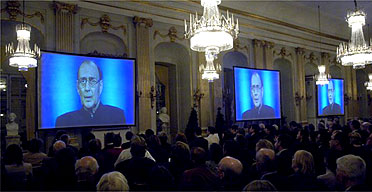December 12, 2005
One day soon there will be a post that doesn't mention populism
As the populism discussion continues on its way, it is by now strikingly clear that the opponents and the defenders of populism are talking about something quite different. This was evident when, over at the comments boxes at Le Colonel Chabert, Le Colonel was aghast at my describing Bush as a populist. For me, it would be hard to think of someone more exemplary of populism than Bush; as Mark Crispin Miller argued persuasively in The Bush Dyslexicon, Bush's downplaying of his privilege and his expensive education are attempts to position him as a 'common man' speaking 'plain common sense' in 'plain language' (which is why his numerous errors, far from harming his credibility, boost it). It was also argued that there are no examples of populism on the left and that, therefore, Zizek's critique was pointless. Leaving aside the fact that Zizek's attack on populism was prompted by a book by Laclau, one of the best-known leftists in academia, it seems to me that there are no shortage of groups on the left which correspond, to the letter, to Zizek's description. Something like the protests against the G8 typically target the oligarchy, 'the corrupt elite', rather than the capitalist system itself. The persistent targetting of Bush, the fixation on instances of corruption like Enron, to take but two examples, imply that, if only we had a less stupid President, if only corporations were run by people with moral probity, then the injustices of capitalism would be at an end. If this isn't the point, why harp on about examples of capitalist stupidity and criminality, as if a smooth-running capitalism staffed by selfless drones would be an improvement ? I take Lenin's point about the ruling class defending its own interests, but the focus ought to be on capital rather than capitalists. Acquisitive personality traits may be attributable to class, but the temptation to equate class with a quasi-tribal ethnicity rather than a structural position needs to be resisted.

One, recurrent, objection to anti-populism was best outlined by Lenin, again from LCC's comments boxes.
'Notes toward a definition of populism, then.
In one episode of Futurama, the evil demagogue controller of Momcorp has programmed all the robots in the world to rebel on Mother's Day and conquer earth. They are so transfixed by her, are programmed to be in fact, that there is no difficulty in moving from general cultish adoration of Mom to acceding to her demand to "Conquer earth, you bastards!" All she has to do is push a button. Curiously, this is given a pseudo-communist twist by an automated greetings card who joins Bender on a looting spree, calls him 'comrade' and advises him about the Glorious Robot Future.
There you have the liberal theodicy in all its blazing stupidity. Populism is the manipulation of the masses by a demagogue, who compels them to rise up under the rubric of a superficially attractive idea and then cunningly uses the situation to become a world-class tyrant. It also reproduces the [c]urrent vulgate of 'totalitarianism': that 'organicism' results in the crushing of the individual under impersonal institutions etc. Making the institution in question a globally dominant corporation renders the fairy tale palatable to the liberal audience.'
The implication is clear: attacks on populism are slurs on the masses. This needs to be reversed; populism is a slur on the masses. Populism - at least insofar as I understand it - does not designate popular movements per se, but rather, is defined by an appeal to a reified notion of the popular. The Populist is a category of the Other - the Other that is less intelligent than us, the Other that can only be communicated to when we patronize it. The masses as construed in populist discourse are never intelligent or dynamic but lumpen, stupid and venal. For example, it is not for nothing that 'postmodern racism' typically takes the form, not of a directly-owned prejudice, but a prejudice attributed to the populist Other, i.e. 'as far as I am concerned, unlimited immigration is no problem; however, They won't accept it, they will riot....' (And not only postmodern racism: this was in many ways old Enoch's position, after all.) This shows that, in many cases, elitist cynicism and populism, far from being opposed, actually require one another. Straussian neo-conservativism, for instance, combines both: on the exoteric side, there are populist appeals to Nation and Religion which, on the esoteric side, are dismissed (the Masters themselves having no need for such fripperies, of course...)
The fantasy of leftist populism seems to be that - in a strategy that couldn't be more opposed to Leninist 'splitting' - making concessions to the already-constituted, lowest common denominator populist Image is a necessary stage on the route to a more thoroughgoing emancipatory project. But low expectations are a trap, whose effect is usually to get reality to fall below them.
UPDATE: Dominic Fox joins the fray...
__________________________________________________________________

On a not unrelated note....
What troubles me about Pinter's recent, well-discussed Nobel address is what usually troubles me about Chomsky: surely he is telling us nothing that we don't already know. The problem is not the denial of facts - who, after Guantanamo, 'extraordinary rendition' and Abu Ghraib, cannot be unaware that America engages in torture? - but denial in that other sense: a disavowal of practical and libidinal complicity in those facts. It is not that, as Pinter says, 'these things never happened'; these things, whilst the subject of endless official denials, are well-known to have happened, which is worse. Pinter's address, after all, was a kind of answer to the question 'is a politics of truth still thinkable?' What was most noticeable about the lecture was the glaring fissure between the first and the second half; the first half, which corresponded to the 'writer's truth' that 'there are no hard distinctions between what is real and what is unreal', the second to the 'citizen's truth', which demands a firm demarcation between real and unreal, the true and the false. What was disappointingly absent from Pinter's lecture - but thankfully is present in his drama - was the Lacanian thesis that truth can only appear as a fiction. A shame, surely, if the political role of literature is reduced to offering brute (and brutalized) tracings of the empirical.
Posted by mark at December 12, 2005 04:39 PM | TrackBack